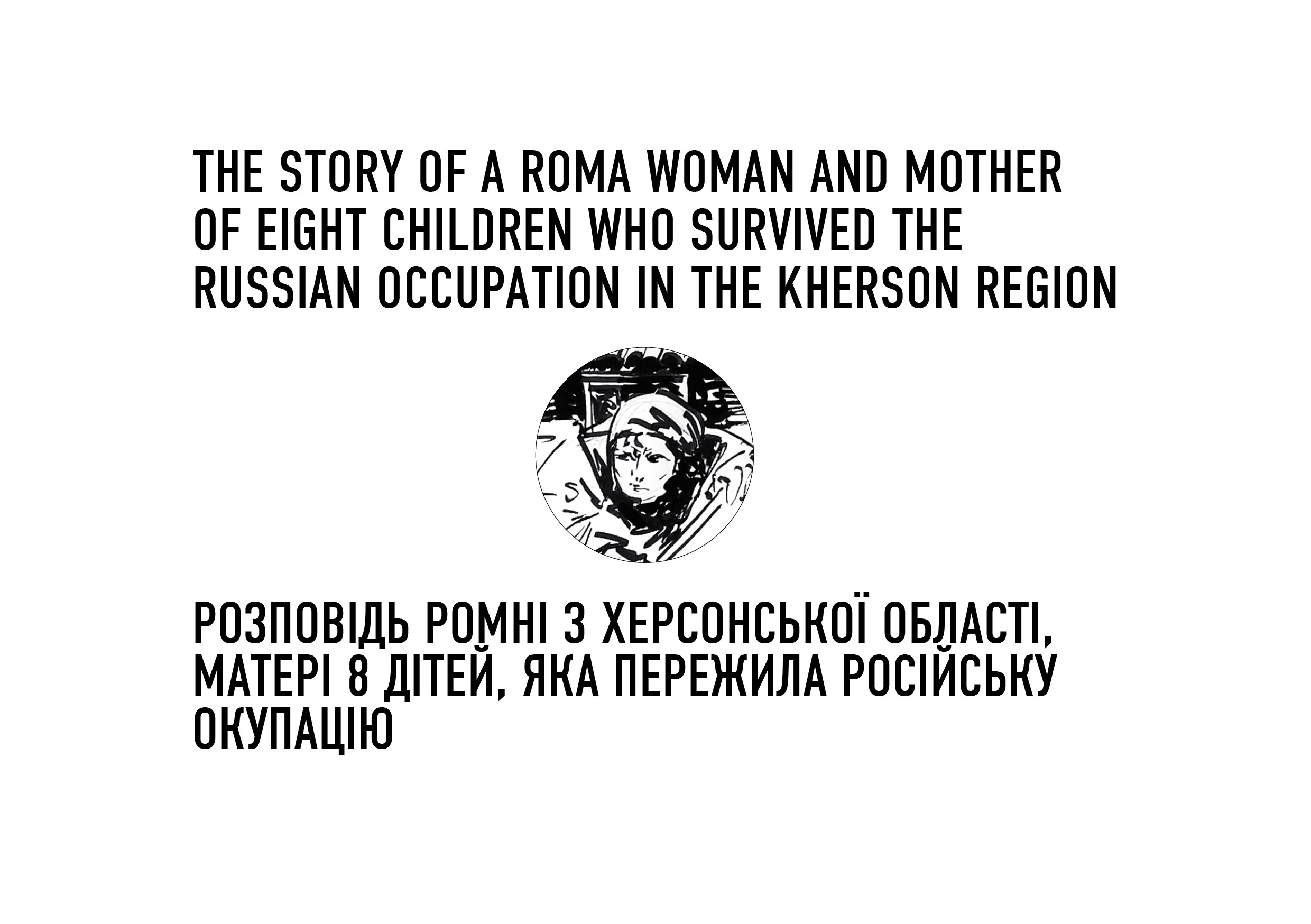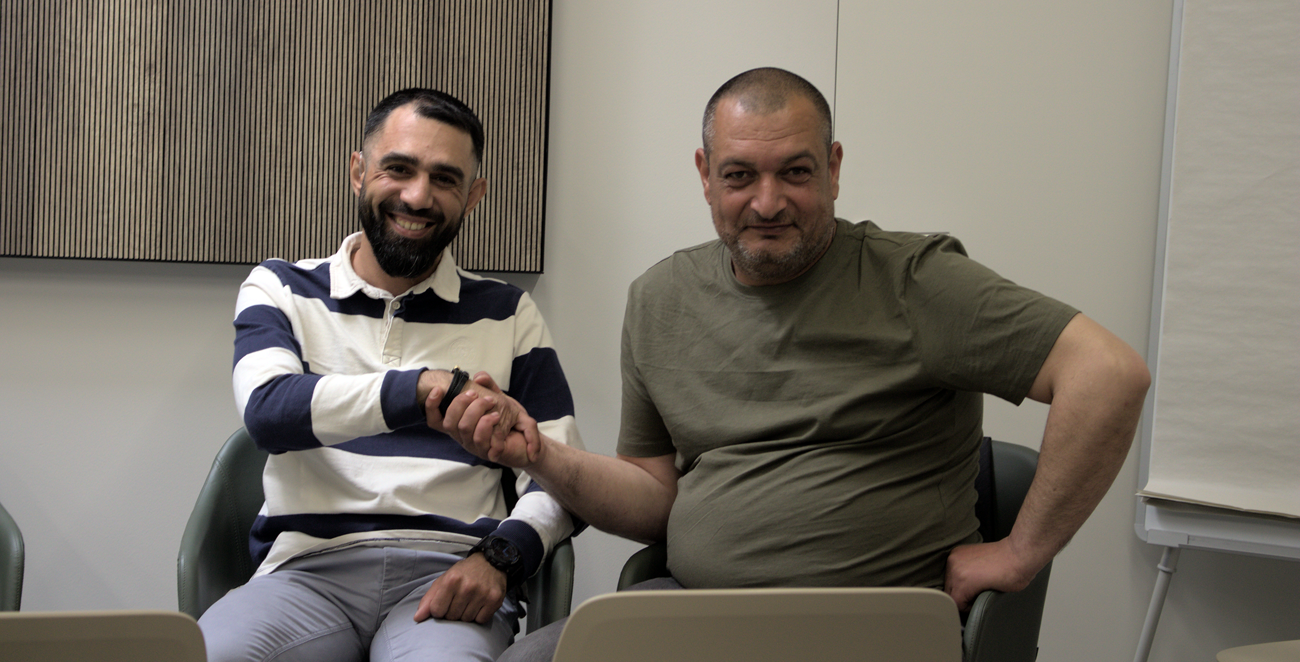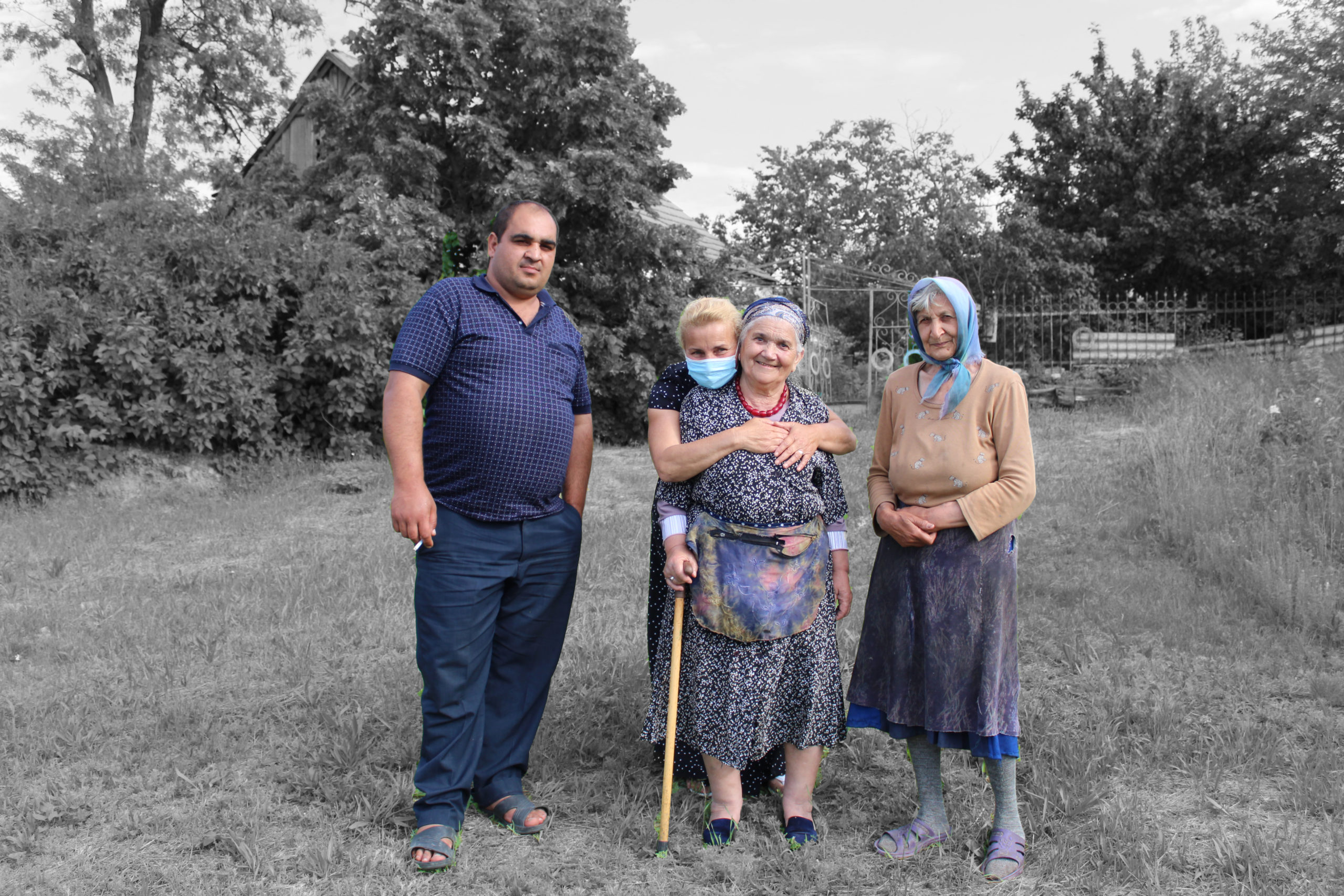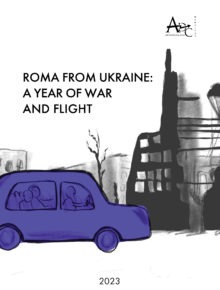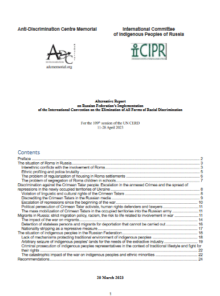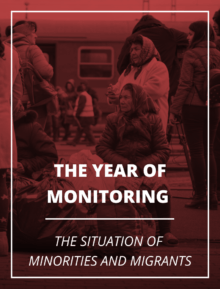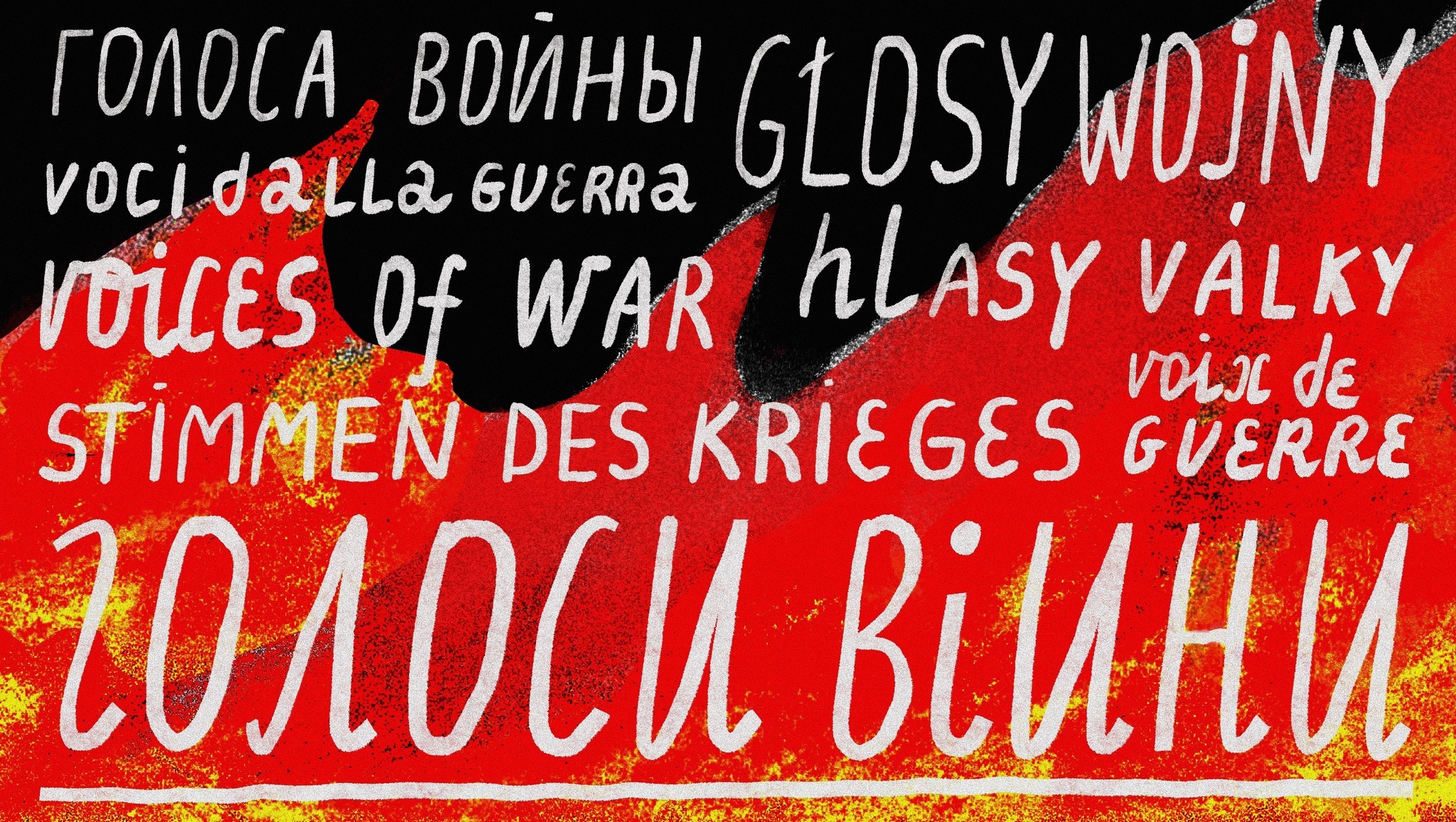“Romani Voices From Hell” – a new report of ADC Memorial dated to the International Roma Day.
Since the start of Russian aggression and hostilities in Ukraine in 2014, ADC Memorial has regularly monitored the situation of the Roma minority in the conflict zone. In 2015, we published the human rights report “Roma and War”, which was later supplemented with the photo report “For Today, They Don’t Seem to be Shooting,” which was about the situation in frontline settlements in 2016-2017.
A full-scale war has been underway on Ukrainian territory since February 24, 2022. The world is following the events in Kharkiv, Kyiv, and Kherson oblasts, in long-suffering Mariupol, and in other cities in Donbas with pain and horror. To mark International Roma Day, ADC Memorial is publishing the accounts of Roma who have faced discrimination and suffered through the agonizing trials of first the COVID-19 pandemic and then the hell of war.
Introduction
Roma people live in all regions of Ukraine, most often in rural localities or in urban settlements of one- and two-story homes. Life in many tabors, which is what dense Roma settlements are known as in the vernacular, has always been difficult, impoverished, and insulated from the outside world. Since Soviet times, such places have had difficulties with clean water, trash collection, registration of homes, and even personal documents.
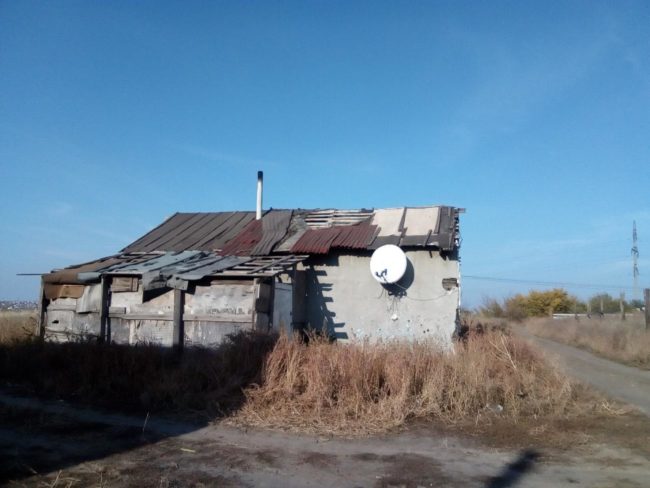
Roma children did not always attend school even in the best of times, and if they did, they never received a full secondary education. After school, many were left without real employment and were forced to feed their families by salvaging metal in dumps, working temporary jobs in fields, and so forth.
Discrimination and social exclusion resulted in poverty, which only served to heighten marginalization and enable prejudices about “criminality.” This sometimes resulted in tragedy.
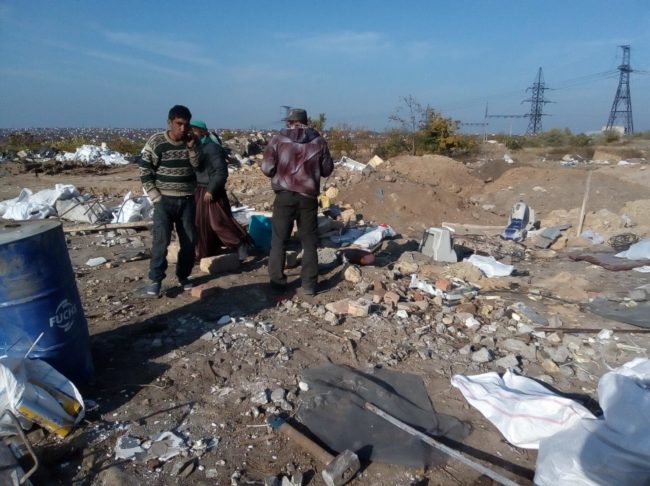
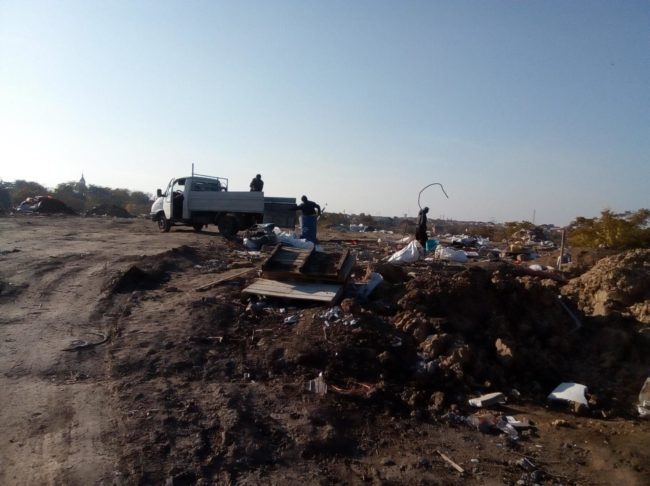
Of course, there were also other families who did not live in tabors, but in nice private homes or city apartments, whose children attended not just secondary school, but also university.
The ills that have descended upon Ukraine’s Roma population – first the epidemic, then the war – have not shown any mercy to either group.
When the entire world was seized by the COVID 19 pandemic, the situation in overcrowded tabors, where it was impossible to maintain social distancing or ensure compliance with hygiene rules, was particularly wrenching. Few people had the chance to get vaccinated, and many Roma did not have the required documents and were not registered with local doctors. Even in relatively prosperous villages, the epidemic affected many young people, not to mention the older generation, whose members face a high risk of death if infected with the coronavirus.
In late 2021, almost every tabor resident in Odesa Oblast was infected, and children, from newborns to young mothers (who were only 14 to 15 years old at the time) were particularly affected. Children and adults who were seriously ill were hospitalized, but many suffered through the illness and the high temperature on their feet, without any medical care.
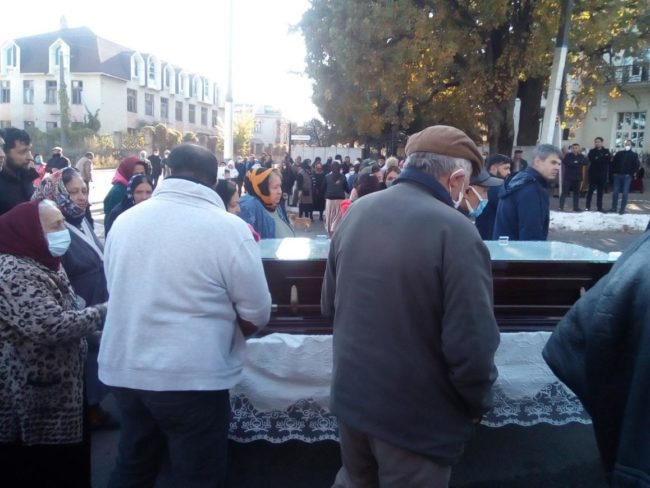
Photo by ADC Memorial
War
“We were afraid that Russian soldiers would kill us and destroy us, like the Germans did in 1941,” –
Roma refugee from Ukraine in the EU.
The war has brought suffering to every Ukrainian home. Many Roma families have tried to leave and save themselves from violence. But not everyone is able to become a refugee – many do not have documents or any money at all. Some simply were not able to leave the regions that the war reached first right away.
We recorded the accounts of people who have remained in Ukraine, of those who are in Odesa Oblast (which has yet to see any hostilities, but where life is also dangerous and difficult), of those in the Russian occupation zone in Kherson Oblast, of those who have remained on the frontlines in Donbas, and of those who suffered through all the terrors of war in the hell of Mariupol.
The Roma of Odesa: danger and solidarity
The NGO Winds of Change helps Romani women and girls and has offered sewing classes for several years. During the war, Winds of Change has been able to enlist its clients to help the country: “Roma women are now baking different goods for the Ukrainian Armed Forces and for women and children waiting for evacuation trains in railway stations. Work in the sewing shop has continued – all of the bed linen that was sown at the beginning of the war has been sent to our soldiers in the Ukrainian Armed Forces.”
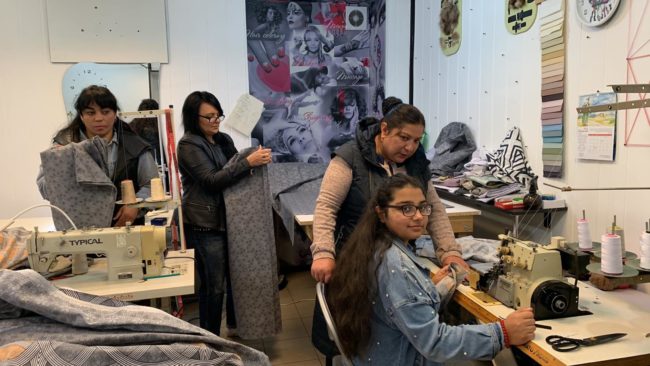
There are also reports that Roma women in Odesa are happy to sew Ukrainian flags: “One of the young women, Maria, is a student. She is 13. Before the war, Masha came to our center and learned how to sew. When the classes ended because of the war, Masha called our staff members. She asked: ‘What can I do? How can I help? I need to do something!’ And now she is so happy and excited to be sewing flags, as if it were the coolest thing in the world.”
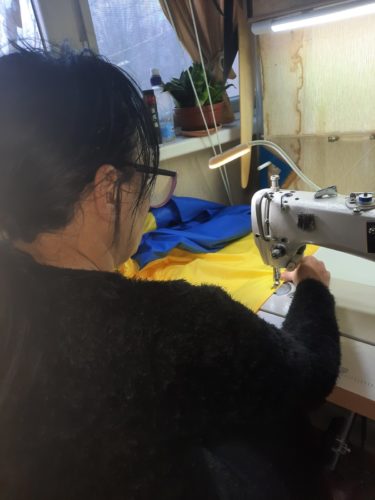
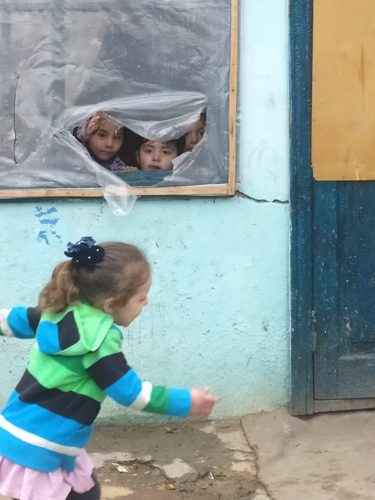
Photo: Winds of Change.
Odesa is subjected to regular shelling from the sea, and the city is dangerous and unsettled. It is becoming more and more difficult to buy food products and other necessities. Volunteers and NGOs are trying to help families in difficult situations.
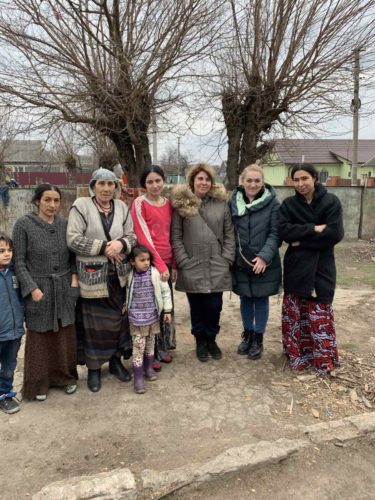
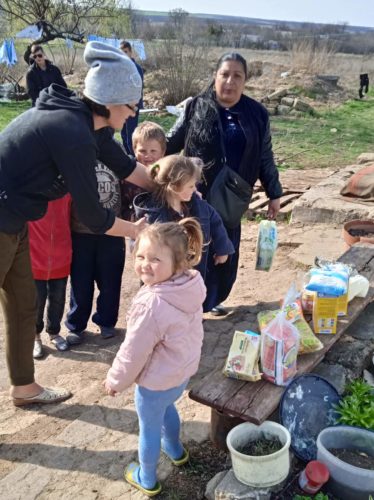
The difficult life of Roma in Toretsk (Donbas): 10 km from the front
ADC Memorial has previously written about the difficult life in Toretsk, which has been on the frontline for nine years now.
The Roma in Toretsk live in the central part of the city in three contiguous dense settlements. According to a local resident, many have found work in recent years: Some have started working as building caretakers and have gained a good reputation, with local residents praising the quality of their work. In addition to permanent work, they have started being hired for seasonal work removing leaves and snow from the streets. The men have started traveling to Kyiv and Odesa for work collecting the harvest. However, the tabors still lack pavements and lighting, and there continue to be major problems with firewood and heating.
The Roma also have problems with water: It is very rare to find water in courtyard wells, and only about five to ten houses in all three settlements have any water at all. Neighbors generally go to those houses for water. And this is to say nothing of toilets and showers: No one has them in their homes. According to one local female resident:
“Our city has major problems with water supply, it’s not just the Roma. Water has always been supplied by the Gorlovsky pumping station, which is now controlled by the separatists. We use water from there. But the quality of this water is unfortunately very poor. The public health authority only recommends it for household purposes and not for cooking. So we buy bottled water in stores or from people who bring it into the neighborhood. Interruptions in water supply are becoming more frequent.”
The lack of water and the poor sanitary conditions are affecting the health of Toretsk’s Roma population:
“Every adult and child has gotten sick during the pandemic. Roma from about 20 families had pneumonia. They were all in the hospital.”
War has been raging in the neighboring villages since late February:
“The neighboring village of Novostroitskoye was destroyed in just one month of war. Volnovakha is in ruins. There are no houses, no structures. Everything has been turned into a black pulp. The village that was recently renamed New York is being destroyed right now. Zaliznoye is next, and then us. So all the explosions reverberate here. And its even louder for the Roma, whose neighborhood is in a sunken part of the city center. There was shelling from the direction of Gorlovki, and the shells rained down on settlements where Roma live. A total of 26 homes were damaged. Two of them belonged to Roma. The roofs and fences were partially destroyed, and a wave from the explosion knocked out the windows. The people who lived there fled to neighbors at the other end of the tabor and are living there for now. The aftermath of the explosions was recorded, but the only assistance families received came in the form of polyethylene to cover the broken windows.
Everything started suddenly, so many families were left with nothing. They had no extra food supplies, and prices for food products are high. Naturally, as soon as it was announced on February 24 that Russia had started a war, food products started disappearing from the stores. Bread disappeared, because our only bread factory isn’t operating now and they stopped bringing in bread from other regions. Gas has also disappeared from gas stations. They stopped bringing it in because gas stations are at increased risk for a major fire in the event of an explosion.
If this is a huge catastrophe for us, imagine what it’s like for the Roma. They naturally have nothing to eat. They say they don’t even have money for bread. They’re actually crying. Our banks have closed. So the Roma are in a state of confusion. After all, most Roma families receive benefits for their children, which they can’t withdraw now. And the stores have stopped accepting cashless payments. At nightfall, long lines start to form at ATMs. Many who go to the bank at night are caught by the police and fined, because we have a curfew. But this doesn’t stop anyone – after all, people have nothing to live on. Everyone lives from paycheck to paycheck, but the Roma population lives from child support payment to child support payment. It’s hardest for them now. They have a minimum of four children in each family, but it’s usually six or more.”
The Ukrainian Association of Sappers and the organization My razom (We Are One) have transferred money to vulnerable groups and have managed to support 20 large Roma families. The already complicated situation with education for Roma children has worsened significantly:
“Because of the hostilities and the constant shelling, schools are mainly doing distance learning. School No. 5, which is where most Roma children go, is also providing instruction remotely. The teachers who have stayed in the city are giving children lessons over the phone.”
The problem of bomb shelters is particularly acute:
“Some Roma have complained that local residents are not allowing them into their cellars. They are being allowed into the bomb shelter in the mine, but it is cold and not equipped with anything.The things is that we have 33 bomb shelters in our city. They are intended for 3,000 people. In 2016, residents of multistory buildings started being required to prepare cellars on their own to hide in during shelling. But these cellars are often filled with trash; there is nothing to remove this trash with and nowhere to take it. So the cellars in these buildings aren’t in any condition for people to hide in them.”
Accounts of Roma from Mariupol: hell on earth
Mariupol residents, including Roma people, have suffered more than others. Roza told us that all the Roma she knows had COVID 19 before the war and that many died:
“As far as I know, all the Roma in Mariupol were seriously ill. My own family got sick three times. We had COVID first, then [the] Delta [variant], and then, quite recently [the] Omicron [variant]. The first time was the hardest. Even my three-month-old daughter got sick. There were no fatalities in our family, but I know for a fact that at least 10 of my relatives and acquaintances died from COVID. This was mainly during the second wave, and mainly because of complications after the illness.”
Roza was able to leave before the city was cut off from the world. She doesn’t know if her house is still standing or not:
“After Russia recognized the Donetsk and Luhansk people’s republics, I understood that Mariupol would be the first to be shelled if a war started. I told my sister to take the children and leave right away. She gathered all her things and came to us. That was at 9 a.m. Everyone in the city was panicking. Lots of people were leaving the city. There were traffic jams, chaos. By 10 a.m., no one was allowed to leave the city. She said that the soldiers had blocked the road and weren’t letting anyone through. Along the way, she drove past Mariupol Airport, which was under heavy shelling. It was bombed just as she was driving by. Her car even shook from the explosions. She was in the car with her husband and two children. People who left later said that the city had literally been wiped off the face of the earth. There is not one district that hasn’t been destroyed. The city has been bombed since the very beginning of the war, and they said that not one day went by without shelling before they left. And it’s not that they were just bombing military sites. They were destroying everything: private homes, daycare centers, schools, hospitals, everything. Many of my relatives and friends have lost their homes. I know for certain that 10 Roma I knew personally have died. We’ll know after the war how may people really died. Some people I know left the city four days ago [March 24]. They said it was terrifying. They were basically driving over bodies. There are a lot of dead civilians on and along the roads. There is no water, electricity or gas in the city. Everything is in ruins. Mariupol is hell on earth.”
Roza and her family reached the Polish border and crossed it on foot:
“We crossed the border very quickly. I used to cross the Russian-Ukrainian border often. They do a complete check. They check all your things, etc. I thought that it would be the same here, but we were treated like human beings. No one paid attention to skin color, clothing, or nationality. After we went through passport control, we were met right away by Polish volunteers. I was in shock from how much support and understanding they had for us. About 100 tents were set up right by the border. We were given food and asked how we were feeling. They gave medicine to people who needed it and checked their blood pressure. I saw that they had crutches, wheelchairs, and other accommodations ready in case any of the refugees were disabled or elderly. They were even feeding people’s pets. I couldn’t believe it.”
Roza is now safe, but she is worried about her relatives who are still in Ukraine:
“My mother, brother, and husband are still in Ukraine. I was in shock. Now the sirens are wailing in the city every day, but there hasn’t been any shelling yet and the city is intact.”
The account of the Roma woman Zhanna, who is from Mariupol, is so dramatic and valuable as evidence that we are quoting it in full:
“We lived in our own home in a neighborhood of single-family homes. About 15 other Roma families also lived there. They were all Servitka Roma. We didn’t experience the problems that Roma often have. We lived well. My husband worked for a bank and had a good salary. My son was in 4th grade and also went to music school and did martial arts. We had nothing to complain of. We built a two-story home on our own. We always had everything and were never in need of anything.
Everything was peaceful here on February 24. We didn’t hear any explosions or shelling. We just watched the news in horror and thought about what we would do. Our mayor, Boychenko, gave a speech and said that Mariupol residents had nothing to fear, that the city was safe. That’s how it was until March 2.
Several days later, the city started experiencing problems with food supplies. The stores started closing one by one, but the ones that stayed open ran out of bread and several other common food products almost right away. There were grits and sugar, but either the prices were so high that not everyone could buy them, or it was impossible to get into the stores, which often had lines of 400 to 500 people. It was virtually impossible to buy gas. Until March 2, it was still possible to pay with bank cards, but after that only cash was accepted. We were not able to withdraw the money we had in advance because the lines at the bank were very long and there just wasn’t enough cash for everyone. Several days later, they simply stopped bringing cash to the banks. At the same time, looting became more frequent. They robbed not just stores, but also banks.
We didn’t communicate with anyone over this entire time because there was no phone service in the cellar. Our relatives thought that we were no longer alive. We started having problems with food. We reached the point where we were each eating one cookie and drinking one glass of water per day. There was no food at all.
Our district came under heavy shelling at 7 a.m. on March 13. A powerful explosion rang out above, and the cellar walls shuddered. We heard glass breaking. We were terrified. I became hysterical. My son was crying hysterically, and we couldn’t calm him down. We thought that the house would collapse on us and that we wouldn’t be able to make our way out. My husband crawled out after the bombing and saw that the second floor of our house was destroyed. It looked more like it had been hit by fragments of a shell than by a shell itself. I had never seen anything like that before: The entire house was riddled with holes, and huge pieces of iron were lying around the yard and on the second floor. The windows on the first floor were broken. The walls were pierced by mangled pieces of metal. We weren’t even able to pull them out. The gates to the house were also riddled with holes. The house of my husband’s second cousin, who lives nearby, was also damaged – the doors and windows were blown out by the explosion.
We spent all this time trying to find a way to leave, but this was not realistic because of the never-ending bombardments and skirmishes. All the Roma families in our neighborhood had left by this time, but we were terrified. Our phone service wasn’t working, so we weren’t able to call the Red Cross or someone else who would know about evacuations. We also didn’t know how to travel with a child. His mental health suffered greatly during the shelling, and he became very nervous. We were told that our neighbors – a husband and wife and their child – were killed as they were leaving Mariupol. Their car was hit by a shell.
We left the city alone; no one was with us. The trip was incredibly difficult – I’ve never seen anything so terrifying in my life. There was not one single undamaged house around. Everything had been destroyed and burned. We saw many cars that had been shot up with dead people in them. The city was just blanketed with human corpses. We covered our child’s eyes so he couldn’t see anything. There were bodies everywhere. The people who had survived were like zombies – they were very dirty and their eyes were filled with terror. I personally saw a person drinking water from a puddle.
There were checkpoints with the Z symbol at every step. At every one of them, we were dragged out of our car and searched from head to toe. They went through all our things in the car. Some of the soldiers behaved very aggressively. They interrogated us for a long time several times because they didn’t like the fact that we are Roma. They suspected us of something, but they didn’t say what specifically. They asked for money, but we didn’t have any. They asked where we were from, what we were doing, and where we were going. They asked why we were staying in Ukraine and not going to Russia or Crimea. This really made them furious. We spent from 30 minutes to an hour this way at each checkpoint, and there were 17 of them. At one checkpoint, the soldiers took all the alcohol that my husband had brought with us from home in case we had the chance to sell it or exchange it for something.
The checks ended when we got beyond the city limits, but we came under fire on Zaporizhzhia Highway. It felt like they were shooting at the wheels. We were in total shock. We couldn’t understand what was happening. My son and I covered ourselves with our coats so that we wouldn’t be injured by broken glass, and my husband just stepped on the gas to get through that area as quickly as possible. We never figured out what caused this, but the car lurched hard several times, and it felt like it was being tossed around. We only reached Dnipro at 10 p.m.
We spent a total of two days in Dnipro, and then they started shooting there, too. After that, my husband decided to send me, my aunt, and our son abroad so that we would be safe. We met up and headed toward the Polish border on March 25. We got through passport control very quickly, without any problems. On the Polish side, my son and I were greeted by Polish volunteers and given everything we needed. We were lucky, because my sister works at a Roma youth center in Poland and her colleagues met us at the border in a car. My son and I are now trying to settle into a dormitory for refugees. My son became very ill after everything he lived through. He has a high temperature and a terrible cough. I myself am in a terrible state. I can only sleep if I take a sleeping pill because my nerves are ragged. My husband stayed in Dnipro with my mother- and father-in-law. There’s shooting there, and I don’t know how to get through this. We have lost everything: our business, our home, our things, our regular, peaceful life. We have no plans at all. We are surviving because of humanitarian aid. We are being given grits, sugar, and so on. There are no job prospects because there are so many refugees here and the city is small. We registered my son for school.”
Kakhovka, Kherson Oblast: occupation.
The city is 50 km from Crimea. Most Roma in the area live in Lyubimovka and Kakhovka. About half of the Roma population in Kakhovka is made up of Servitka Roma, while the rest are Crimean Roma. Only Crimean Roma live in Lyubimovka. The city has a population of only 35,000, and the Roma population (about 600 people) is very noticeable. A local Roma man named Roman (we have changed his name) recounted:
“Before the war, many people had jobs, some permanent, some are day laborers in the fields or at the market. Most children attended school. School No. 6 is known as the ‘Roma’ school. Its infrastructure is not as good as other schools, but it always accepts all Roma children. There have been times when a parent or teacher did not want Roma to attend the school, but this never reached the point of a conflict. The problems were mainly in other, better off schools. For example, Roma children are not accepted to schools No. 3 and No. 4 insofar as possible. Teachers don’t want their rankings to fall, and many of them are not able to connect with Roma children. It’s even harder for children who come from other regions. When teachers see that children are not from Kakhovka, but from other places, they don’t accept them regardless of the circumstances. They say, these aren’t residents, which means they will leave, so there’s no point in investing in them. Now schools are closed. They offer distance learning, but not every day. School No. 6 is used as a shelter. In the first days [of the war], lots of people, lots of Roma, were hiding there because it has a bomb shelter.
We didn’t believe that there would be a full-scale military conflict. We knew that forces were amassing along the Russian border, but we didn’t think anything would happen up until the last minute. On February 24, I woke up at 4 a.m. or 5 a.m. from strong vibrations in the house and immediately understood that an attack had started. These were explosions. I called Novaya Kakhovka and learned that their weapons warehouse had been blown up and there was fighting. We have a private house and a large cellar, so it is safer to shelter with us when there is shelling. Another Roma family that lives in a multistory building came to us. They had no place to shelter, so we decided to take them in, too. For the first five days, we spent half the day in the house and half the day in the cellar, because the bombing was very heavy. Now we hear rockets being launched a couple of times a day, but I don’t even know where they’re coming from or where they’re going. The city itself is quiet. I recently wanted to go to the store. I got into the car and saw that a Russian tank and two cars carrying soldiers were driving down our street. I got very scared and just kept sitting in the car. Then I got out and returned home. Some Roma tried to leave, but the Russian soldiers are turning everyone back. They say that no one is allowed to leave the city.
I can say that people are rapidly becoming impoverished and experiencing need. The situation is worst for people who were poor before the war, who survived on daily earnings. And that mainly applies to the Roma. The poorest families worked in the fields, pulling up weeds, peeling onions, working in the greenhouse. They earned 300 to 400 hryvnia a day. Some people went around villages collecting feathers and delivered them to the bases, while others went to the market to trade goods, mainly from Odesa. Some went to the market in Novaya Kakhovka to sell [their goods], but they obviously don’t go there now. Some people are still going out to sell what they have in their reserves, but the problem is that no one is buying anything or has any earnings. This means that the situation of the Roma is catastrophic. Another problem is medications. The pharmacies are almost empty. There are no pain relievers, blood pressure medications, or even the most common medications. Recently a Crimean Roma man was wounded. He was operated on two days ago. Because there are no pain relievers in the city, he must now try to manage his pain without them. We collected as much [money] from relatives as we could.
Many Roma families in Mariupol died in the bombings, but it’s impossible to know how many. We can only guess. For example, my mother’s friend from Mariupol often speaks with her by phone. They talk almost every day. But it does happen that she falls out of touch and cannot be reached. Then she calls several days later and says she spent several days in the bomb shelter. She says there is no water, electricity or gas in the city. The same thing is happening with many people we know. Sometimes they just stop getting in touch, and we don’t know if they are alive or not.
As far as other localities in Kherson Oblast are concerned, I know for certain that in Vysokopillya Russian soldiers turned a Roma home into something like a hotel and are now living in it. They took anything of value that could be taken. They took away the owner’s car. I’ve heard that other Roma families from there ended up in the same situation. The houses that Roma fled are occupied by Russian soldiers. They take the nicer homes. They apparently haven’t touched the Roma who stayed, but there have been cases where people have just disappeared. The Roma man R. recently disappeared in Vysokopillya. There was no news from him for a week. He just disappeared. His mother started to get worried and went to the talk to the Russian soldiers to see if they had her son. They said that they had him, that they had picked him up because he didn’t have any personal documents. She went home to get his papers, but when she returned, they told her that they didn’t have her son and had never had him. I heard that he returned home a week later. We don’t what happened to him in captivity – he’s scared to say.”
Refugees
There are quite a few Roma from Kharkiv, Mariupol, Kherson, Odesa, and other cities among the millions of Ukrainians who have been forced to seek refuge outside the country. Along with the hardships of life as a refugee, some of them sometimes encounter xenophobia and prejudice in the countries offering housing and support to Ukrainians suffering from the war.
According to Antonie Rašilovová, a student in the Department of Dramatic Theater at the Academy of Performing Arts in Prague who volunteers for the group Czechs Are Helping, the Romani women she helped find spots for in a dormitory were evicted from it the next day. The family was not given any warning that it would have to move out the day after moving in:
“However, the next day the administration of the facility called us to take the family away. We transferred the family to another facility that same day where they also were offering help to refugees from Ukraine, and the situation repeated itself – they refused to provide long-term aid to the Roma.” In the end, the family received housing through the joint efforts of volunteers and the NGO Romodrom.
Joanna Talewicz-Kwiatkowska, an activist helping refugees in Poland, explained how Roma are often not allowed into refugee reception centers in Warsaw. Sometimes Romani people are driven out of train stations under the pretext of preventing theft:
“If they’re Romani, then they’re ‘thieves.’” Even our president, Andrzej Duda, retweeted a tweet saying that ‘Roma from Kherson stole a Russian tank.’ This doesn’t help us at all. News like this makes people think the Roma in refugee centers are thieves. I keep hearing from volunteers that the Roma take too much medicine, too much food, too many clothes, all to resell it later. But I have never seen Roma selling clothes on the street. These situations are becoming more and more common every day. But the fact that all manner of people, including all manner of Roma, are coming here is not a reason to refuse aid to everyone.”
Joanna is convinced that the tension between Ukrainians and Roma in refugee centers is rooted in complicated relations between the two groups.
The Romanian website libertatea reports that on March 10, over 30 Roma (22 children and 11 women) from Ukraine arrived in Budapest’s Keleti Railroad Station, where they were met by volunteers from a local humanitarian initiative and put in a specially equipped hall for refugees. Roma are also met at the station by volunteers and placed in tents that the local authorities have set up on the station’s territory. However, we have received complaints from Roma themselves about how they are treated in these refugee centers. For example, according to one Romani woman:
“We are Roma from Kharkiv. We were not allowed to warm up here. They also didn’t allow us to take anything to drink. And they didn’t let our child have things. They apparently take us for locals. There are 31 of us, including 18 children. Our luggage was lost. Before this we spent three nights in a gym.”
Some Roma who ended up in refugee camps in Germany have complained that they were immediately “accused of theft before we even lived with them.” Others said that they were “accused of stealing bread in the cafeteria, but we took two pieces, the child wanted bread.” However, this isn’t happening everywhere – these same Roma felt good in other camps and were not mistreated.
As the above interviews with Romani people who fled Mariupol show, many of them are grateful to the countries that have provided them with refuge, housing, and the ability to work and study. Romani people speak with particular gratitude about the work done by volunteers and about help they received along the way for people with children. But they are all terribly concerned about their friends and relatives still in Ukraine and say that they are waiting for peace so they can return home.









 Feedback
Feedback 

